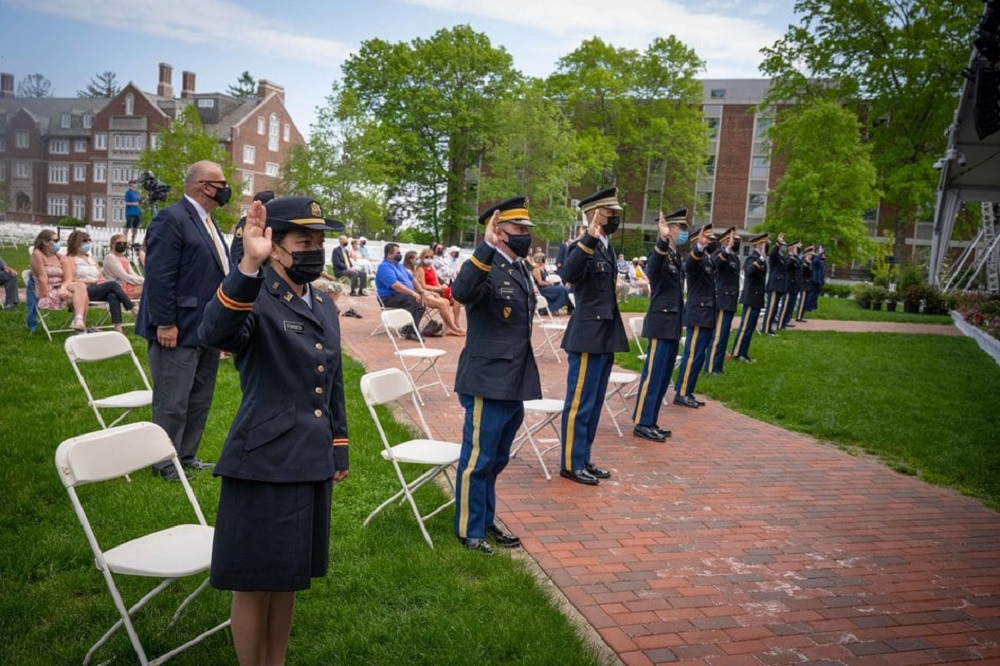Donald N. Zwiep, emeritus professor and former head of WPI’s Department of Mechanical Engineering, died on April 14, 2012, in Naples, Fla. He was 88.
"In my early years as president of WPI I had the pleasure of several interactions and strong encouragement from Professor Zwiep," WPI President Dennis Berkey said. "An elegant gentleman and a deep devotee of WPI, he was an exemplar of what WPI has stood for and achieved over the decades. Clearly, the institution was most fortunate to have had his service and loyalty."
Zwiep was the longest serving academic department head in WPI’s history. He came to the university in 1957 as professor and head of the Mechanical Engineering Department and held that post until he stepped down in 1988 to serve as acting provost. During his 31-year tenure, undergraduate enrollment quadrupled and graduate programs were inaugurated. The manufacturing program was formalized under his leadership and a graduate program in materials science and engineering was launched.
He also helped propel effort to acquire a nuclear reactor for WPI and was instrumental in establishing the Management Engineering Department, which he served as co-head. In the early 1970s, he played an active role in the creation of the WPI Plan, the university’s innovative project-based undergraduate curriculum. He was also the advisor to WPI’s first residential project center in Washington, D.C., and director and chairman of the Manufacturing Engineering Applications Center.
"When I left the department, we had considerably more students enrolled in ME department programs than the school had in total when I came," he told the WPI Journal in 1987. "I’ve been privileged to be involved with continuous educational growth. When I came here, WPI had a significant bachelor’s degree program, an MS program on the books but not carried out to any degree, and no PhD program. All of these have quietly, yet effectively, developed throughout the years. At the same time we have always put a strong emphasis on quality teaching while also recognizing the necessity for complementary scholarship."
Following his retirement in 1990, Zwiep became active as an undergraduate project advisor, working with student teams in London, in The Netherlands, and at NASA’s Goddard Space Flight Center and Johnson Space Center.
In addition to his long academic career, Zwiep distinguished himself through his service to the American Society of Mechanical Engineers (ASME). He joined the society in 1947, while still a college student, and held many local, regional, and national advisory and committee positions. He also served as the 98th president of ASME in 1979-80, the society’s centennial year.
During his presidency, he helped make significant changes and was an active participant providing leadership and guidance in the restructuring of the society’s governance. He also established better lines of international technical communication, pioneering some of the first cooperation agreements with mechanical engineering professional societies in Indonesia, Japan, and the Philippines.
A native of Hull, Iowa, Zwiep attended Northwestern Junior College in Orange City, Iowa, before volunteering for the Army Air Corps in 1943. As pilot and commander of a B-24 bomber with the 10th Air Force, 7th Bomber Group, he flew 40 supply missions and 19 bombing runs over the Himalayas, known to the pilots as the "hump." The operation, in which 3,000 Allied planes were lost, provided supplies for the American and Chinese armies and air forces in China. It was the first time such a massive airlift has been attempted. Several decades later, Zwiep received the China War Memorial Medal from the government of the Republic of China. It was known as the "lost decoration of World War II" because the paperwork authorizing the award was misplaced at the end of the war. Zwiep retired from the Air Force Reserve in 1989 as a Lieutenant Colonel.
After the war, he returned home to study at Iowa State University, where he earned a BS in mechanical engineering in 1948. After graduation, he worked for Boeing in Seattle as a landing gear designer and with the U.S. Army Corps of Engineers in Cheyenne, Wy., on the design and construction of a small airport, before returning to Iowa State to earn a master’s degree. In 1951 he joined the faculty of Colorado State University and became actively involved in the Young Engineering Teachers group within the American Society for Engineering Education. That brought him to the attention of Lawrence Price, dean of the faculty at WPI, who invited him to become head of the Mechanical Engineering Department.
In 1965, during WPI’s centennial year, the university honored Zwiep with an honorary doctorate in engineering. ASME also recognized his professional achievements by electing him a Life Fellow in 2004 and bestowing on him the Distinguished Service Award and Honorary Membership. He was also a lifelong member of ASEE and served on the Accreditation Board for Engineering and Technology (ABET). He was chairman of the James F. Lincoln Arc Welding Foundation from 1976 to 2000, serving as judge and director of their annual awards contests for students and professionals.
He is survived by his wife, Marcia; four daughters, nine grandchildren, and two great-grandchildren. A memorial service will be held at the American Reformed Church in Orange City, Iowa, at 10:30 a.m. on May 26, 2012. Memorials donations may be made to the Donald Zwiep M.E. Memorial Fund, WPI, 100 Institute Road, Worcester, MA 01609-2280.


